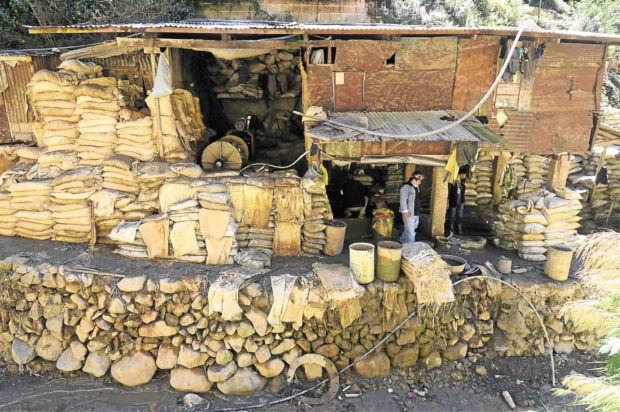
MINE WASTE Gold processing facilities found by authorities on Feb. 10 in Baguio wash their mine waste straight into a tributary of the Bued River. —KARLSTON LAPNITEN
BAGUIO CITY — It’s business as usual for unlicensed small-scale miners in Benguet province, following Environment Secretary Roy Cimatu’s launch here on Feb. 14 of a nationwide crackdown on illegal mining.
Although the pocket mining industry was alarmed by this development, Lomino Kaniteng, president of Benguet Federation of Small-Scale Miners Inc., said an abrupt halt in operations meant immediate unemployment for 23,000 miners in seven of 13 towns in Benguet.
Mining financiers
“Each miner has a family to feed and children to send to school. How can they make ends meet if they stop?” Kaniteng said, adding that grocery stores and food establishments in mining communities would also suffer.
On Feb. 10, Cimatu formed the National Task Force Mining Challenge, which closed down 18 pocket mines and dozens of gold processing plants within the Philippine Military Academy reservation here.
“It hurts the people but we have to implement the law. This is their livelihood but they need to follow regulations,” Cimatu said.
According to Kaniteng, only few clans operate pocket mines. Most pocket miners were actually just working for businessmen who finance small tunnel operations.
As soon as gold is sold, the profits are divided among miners, after financiers deduct their share.
Government taxes
An average of 50 kilograms of gold was sold weekly to 100 black market dealers in Baguio, generating P2 billion in gold sales annually.
A gram of high quality gold sells for P1,500, while gold assessed to have low purity sells for an average of P900, according to a local dealer.
The imposition of a 7 percent tax discouraged pocket miners from selling gold to the Bangko Sentral ng Pilipinas (BSP) in 2012, said Kaniteng.
In November last year, the Department of Finance (DOF) reduced the creditable withholding tax on gold sales from 5 to 1 percent to lure small-scale miners back to transacting with the BSP. DOF, however, retained 2 percent as excise tax.
Uncertain future
As a result, P1.5-million worth of gold was sold to the BSP Baguio office in January, according to a report from the Bureau of Internal Revenue office in Cordillera.
But small-scale mines operate with uncertainty. Only 12 of 100 small-scale mining associations have been granted temporary small-scale mining permits or contracts by the provincial mining and regulatory board (PMRB).
The temporary permits were extended by the PMRB until their areas of operation were declared as Minahang Bayan, or community mining area, said the Mines and Geosciences Bureau in Cordillera. —Karlston Lapniten